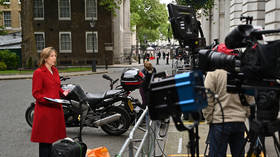‘News’ becoming ‘views’: Veteran journalist Neil Clark explains plummeting trust in UK media

When “dispassionate” reporting of news in the UK is getting replaced by thinly-veiled opinion pieces, it’s natural that both conservatives and left-wingers trust the media less and less, RT contributor Neil Clark said.
The “core issue” of the decline of public trust in news organizations in Britain is that outlets do more editorializing when presenting news, rather than work as impartial sources of information, Clark said.
[The line] between news and views has been blurred, basically.
In its recent report, Oxford University’s Reuters Institute for the Study of Journalism found that trust among people who self-identify as left-leaning had plummeted from 38 percent in January 2019 to just 15 percent a year later. Likewise, the proportion of right-leaning Brits who trust the media dropped from 46 percent in 2015 to merely 15 percent this year.
Clark finds this data unsurprising, pointing out that people on both sides of the political spectrum have felt deeply dissatisfied with the way strictly factual reporting oftentimes looks and sounds more like opinion pieces.
You’ve lost that dispassionate reporting of news.
The “cutoff point” for the left occurred in 2015, when Jeremy Corbyn took over the leadership of the Labour Party, Clark noted. “There is no doubt at all by any assessment that the media portrayal of Corbyn was almost consistently hostile and very, very critical, without much balance.”
Also on rt.com British politicians and the MSM have sent a clear message to the white working class for decades: 'You don’t matter'Conservatives, meanwhile, began to feel “aggrieved” over the coverage of the protracted Brexit talks.
It’s so polarizing. And the atmosphere became so toxic that, of course, both sides were going to complain.
The journalist recalled the recent case of Emily Maitlis, presenter of the BBC’s flagship Newsnight program, who went on a rant against the prime minister’s chief adviser Dominic Cummings, accusing him of violating quarantine rules. “Cummings broke the rules – the country can see that,” she said live on air.
The channel received nearly 24,000 complaints over the episode, with viewers blasting the show for “bias” against Cummings and the Tory-led government. After the uproar, BBC admitted that Maitlis had broken the channel’s own impartiality guidelines.
“It was like an editorializing diatribe by Maitlis, and that’s a sort of thing you wouldn’t see on the BBC years ago,” Clark said.
The journalist believes that the only way to fix the situation would be to “clearly delineate between news and views.”
Think your friends would be interested? Share this story!












